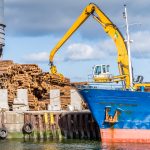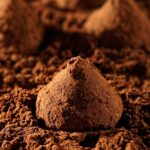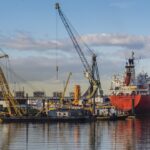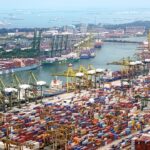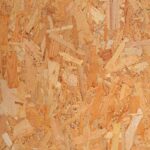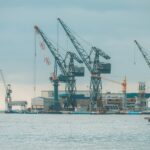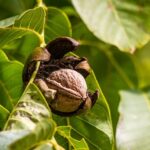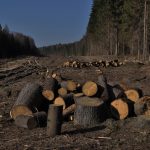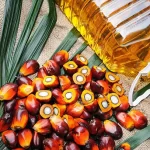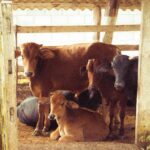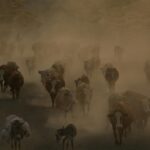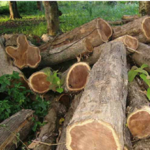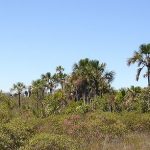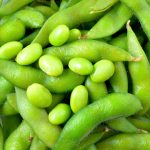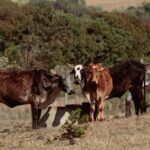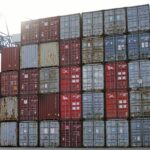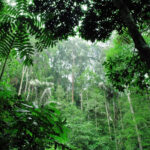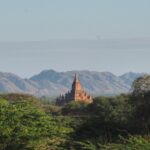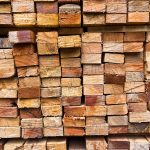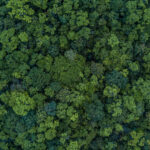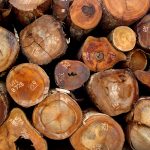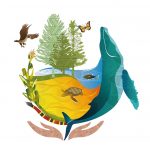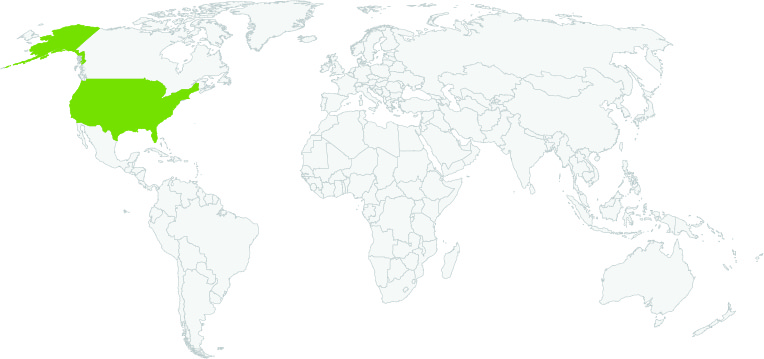
In order to construct their wind turbine blades, energy giants in the U.S., such as GE Vernova, and leading manufacturers in China, like Goldwind (金风科技) and Mingyang (明阳风电), appear to have relied for years on balsa wood sources that include timber stolen from protected forests and the exploitation of Indigenous communities in the Amazon. This report reportedly connects the dots between deforestation, human rights violations, and some of the world’s leading wind turbine blade manufacturers.
Cambodian companies producing engineered hardwood flooring for the U.S. market are getting their timber from a company described as a cartel that’s been repeatedly accused of illegally logging inside protected areas. Angkor Plywood is the sole supplier of plywood to flooring manufacturers based in the Sihanoukville Special Economic Zone, and claims the wood comes from its acacia and eucalyptus plantations.
However, watchdog groups, industry insiders and independent media, including Mongabay, have long documented evidence of Angkor Plywood and its supplier, Think Biotech, felling tropical hardwoods inside Prey Lang Wildlife Sanctuary.
AHF Products, which claims to be the biggest U.S. wood flooring manufacturer, runs a factory in the Sihanoukville SEZ, but denies any protected wood entering its supply chain — a claim industry veterans question, given Angkor Plywood’s notoriety.
On September 19, 2024, the United States and Ecuador convened the inaugural meeting of the of the Trade and Environment Committee (Committee) under the United States-Ecuador Trade and Investment Council. The Committee, chaired by Assistant United States Trade Representative for Environment and Natural Resources Kelly Milton, exchanged views and priorities regarding trade and environment policies, including addressing the climate crisis, and finalized the Committee’s work plan, which establishes a series of in-depth discussions to deepen our bilateral trade relationship. The Committee also shared perspectives and experiences on forest sector governance and combating illegal logging and associated trade.
The Office of the United States Trade Representative (USTR) announced enforcement action under the United States-Peru Trade Promotion Agreement (PTPA) Forest Sector Annex. USTR requested the Government of Peru to verify that five timber shipments exported to the United States from Peru complied with applicable Peruvian laws and regulations.
A global shortage of cocoa beans has led to a race among cocoa bean processors to secure high-quality beans, while shunning older varieties. The UK has a large stockpile of lower quality beans from Cameroon, viewed in the industry as of lower quality. Companies had hoped the incoming EU Deforestation Regulation would allow the lower-grade material to be written off as unusable. But the EUDR allows existing stocks to be “grandfathered” — meaning they could still be bought and sold.
According to the Indian Centre for Science and Environment, the country’s 2022 demand for timber was 63 million cubic metres—30 million cubic metres for domestic production and 33 million cubic metres from imported sources.
Uruguay is India’s top market for sawlog, with India’s Ministry of Commerce and Industry reporting that Uruguyans account for more than 20% of total trade for the first six months of 2024 (487,700 cubic metres) ahead of Australia (14.4% or 347,600 cubic metres), Ecuador (12.1% or 293,300 cubic metres), Argentina (9.1% or 213,700 cubic metres) and the United States (7.6% or 193,000 cubic metres).
India has emerged as one of the United States’ most important export markets, with 116,000 cubic metres of softwood lumber shipped from the West Coast to India last year alone. Already its fastest-growing hardwood market, the US is capitalising on India’s construction industry and, in the process, making up for a drop in Chinese demand—with total lumber exports almost tripling for the first six months of 2024 over last year.
While import volumes remain lower in 2024 compared to 2023, India is competing with China to become the world’s largest consumer market for structural timbers. The Modi Government is grappling with a 19 million-unit housing shortage, which will double over the next five years.
Fuelling India’s demand for roundwood is a decision made in 2020 to reverse a 27-year ban on using timber in public buildings.
The United States has launched a new initiative aimed at countering the illicit financing of environmental crimes in the Amazon, signaling that the issue is becoming a higher international priority. U.S. Treasury Secretary Janet Yellen recently introduced the Amazon Regional Initiative Against Illicit Finance, designed to enhance training, cooperation, and information sharing to assist authorities in pursuing money-laundering investigations tied to transnational criminal organizations. This marks an escalation in efforts to combat what is now recognized as the third most profitable category of organized crime globally.
Environmental crimes rampant across the 6 million km² Amazon basin include land grabbing, illegal logging, illicit mining, and unauthorized agriculture and ranching.
American Hardwoods Export Council (AHEC) highlight challenges facing the US hardwood sector to satisfy the EUDR. The risk of US hardwood deriving from such deforested land is extremely low, according to AHEC. “It’s estimated that disturbance of hardwood forest in terms of conversion to agriculture is running at about 0.005% of the total area a year.”
Regardless, the US hardwood sector will have to provide proof that each consignment of timber is legal and deforestation-free, and that’s the problem. The fragmentation of forest ownership and the low intensity management in the USA’s nine million private holdings. With mills sourcing from a supply base of small forest plots, often family owned, they would need to provide multiple geolocation coordinates for each timber shipment. Moreover, as these plots may only be harvested once a generation, sourcing coordinates would be different from year to year.
According to Eurostat, the EU’s statistical office, between June 2021 and December 2023, the EU imported more than €34 million worth of teak directly from Myanmar.[1]
Notably, total teak imports from Myanmar into the EU decreased from around €23.5 million in 2022 to just over €3.8 million in 2023. While this is a positive decrease in the trade, this figure should be at zero.

Teak decking on a sailing yacht
And does this tailing off of direct trade mean demand for teak has decreased? It is unlikely. EIA strongly believes that Burmese teak is being shipped into EU and US markets via other countries by traders who disguise the wood’s true origin to circumvent sanctions.
A prime example is that of neighbouring India, which has seen an increase of teak imports into the EU rise from a total figure of around €500,000 in 2021 to nearly €7.5 million in 2023, according to Eurostat.[2] Similar upward trends are seen for shipments to the US, according to the global trade database Panjiva.
US authorities increasingly suspicious of the surge in plywood and lumber coming from Vietnam, Malaysia and other countries in the wake of the US introducing an 85% tariffs on plywood coming from China. American timber traders are at huge risk of prosecution with Chinese timber exporters now using third-party countries in Asia to trade into the US supply chain.
Special agents are cracking down on the surge of Chinese timber evading tariffs and entering American supply chains after a small-time timber importer was the latest to be sentenced, this time for three years probation and a US $360,000 fine after it falsified documentation to avoid paying import duties. The sentencing comes just months after a Miami husband and wife were both sentenced to 57 months in prison for illegally importing and selling up to US $65 million of plywood manufactured in China and, in the process, violating the Lacey Act and customs laws.
Russia and Belarus now account for 70% of all Chinese lumber imports.
Russia is ramping up plywood production, with exports to China surging more than 344%, according to new data provided by Roslesinforg – the Russian state-owned customs agency.
The latest numbers come after China Customs reported that exports to China had tripled for March. environmental groups have flagged concerns that China is operating as a broker for Russian and Belarussian timber, with plywood made from Russian birch entering European markets via China, Vietnam and a series of “friendly countries” across Eurasia.
In a sign of the continued bipartisan consensus about unfair trade with China, the Biden administration will impose $300 billion in tariffs on electric vehicles, microchips, and other goods from China. This action will also extend the Section 301 tariffs on hardwood plywood and engineered wood flooring.
Expect increasing re-routing of Chinese plywood and engineered wood flooring through 3rd countries such as Vietnam, Cambodia in efforts to obscure country of origin and avoid these tariffs.
Plywood imports from Vietnam have now tripled – with US cracking down on Chinese traders using Vietnamese ports to bypass trade regulations,
The vast majority of imports are made up of birch plywood (77% or 187,000 cubic metres), with Brazil (191,000 cubic metres), Indonesia (140,000 cubic metres), Chile (119,000 cubic metres) and Canada (114,000 cubic metres) responsible for the balance.
Corporate Transparency Act (CTA) was designed to help law enforcement prevent money laundering by requiring shell companies to report information regarding their beneficial owners (BOI) to the Department of the Treasury. The Decorative Hardwoods Association and other US associations believe that the way the CTA has been designed, the brunt of its reporting burden and excessive penalties will be shouldered by law-abiding, Main Street businesses.
While this legal action focused on false labeling of country of manufacture, it echoes some of the same issues that US Lacey cases have with regard to false labeling of country of origin. Williams-Sonoma has multiple lines of furniture, including those under its brands Rejuvenation, Pottery Barn Teen and Pottery Barn Kids.
A recent investigation of illegal tree harvesting on the Mark Twain National Forest that led to the indictment of a southern Missouri man used an uncommon form of evidence—DNA from an illegally harvested log. This case marks the first time that tree DNA was used to investigate a federal timber poaching case in the eastern United States.
Russia is now facing a growing gap between timber production and log supply, with production growing 5% in 2024, while commercial logging of Russian forests has nose-dived 26%.
That is according to Lesprom’s “Russian Lumber Industry Insights,” which reports that Russian sawmills are now bleeding thanks to a critical shortage in raw materials and are struggling to meet rising demand from major export markets.
The problem for Russia is that Western Companies—which provided much of the foreign direct investment needed to modernise logging operations in the decades leading up to the 2022 war—have now exited the country on mass, creating large gaps in the Russian supply chain.
A new analysis by Global Witness, an environmental watchdog organization, and Trase, a nonprofit that analyzes supply chains, finding that palm oil is now the commodity consumed by Americans that contributes most to the loss of tropical forests. Researchers looked at import data and deforestation rates and found that palm oil bought by Americans may have caused 103,000 acres of deforestation, mostly in Indonesia.
Sanctioned Russian birch plywood worth an estimated €40 million has been seized at Rostock Port in Germany. The ship was en route to the United States, but stopped in Germany for an emergency. The Canadian-owned shipping firm argue that the vessel’s cargo should be exempt, because it only docked in Germany due to an emergency. German Customs have rejected that argument. The wood may be linked to a Russian timber giant Sveza, which is part-owned by Alexei Mordashov, Russia’s richest man and a subject of EU and US sanctions.
Also reported here:
€40M of Conflict Timber Seized: How the US $2B Log Trade Fuels War | Wood Central
The New York state’s Attorney General is initiating a lawsuit against Brazilian meatpacker JBS for misrepresenting its environmental impact with “fake sustainability claims to boost sales”. A large part of the lawsuit focuses on JBS setting a net zero goal for 2040, but not to releasing a realistic plan to achieve that goal. A significant amount of the company’s emissions come from deforestation in Brazil to clear new land for cattle grazing.
Please use the sharing tools found via the share button at the top or side of articles. Copying articles to share with others is a breach of FT.com T&Cs and Copyright Policy. Email [email protected] to buy additional rights. Subscribers may share up to 10 or 20 articles per month using the gift article service. More information can be found here.
https://www.ft.com/content/4335c54a-a099-46c6-9d0f-2f8edff7dc8e
Brazilian beef group JBS is facing mounting opposition to its planned US share listing from politicians and campaigners, with New York officials now accusing it of “greenwashing”. The state’s attorney-general Letitia James announced she was suing the American arm of JBS last week, alleging that it misrepresented its environmental impact with “fake sustainability claims to boost sales”.
Illegal timber from Myanmar continues to be imported into Europe and the US despite Western sanctions. In Europe, Italy continues to stand out as a destination for teak and other controversial forest products. Between January and October 2023, Italian companies imported more Myanmar wood products than any other European country — about $3.3 million worth — for use in furniture and construction, according to Italian government data analyzed by the national timber trade association FederlegnoArredo.
The destruction of the Cerrado is closely linked to the growing demand for meat and dairy. This report shows that some of the world’s largest investment funds that have put billions into buying farmland in the Cerrado, including pension funds in Sweden and Germany, Harvard University’s endowment, and the Teachers Insurance and Annuity Association, better known as TIAA, the $1.2 trillion pension fund for 5 million people across the United States. Thanks in part to its investments in Brazilian farmland, TIAA has become one of the largest farmland investors in the world. Through its wholly owned subsidiary, Nuveen Natural Capital, the fund has accumulated some 3 million acres across 10 countries. Its investments in Brazil, where it manages 1 million acres, are some of its most controversial holdings.
On January 26, 2024, the US Departments of State, Treasury, Commerce, Homeland Security, and Labor, and the Office of the US Trade Representative published a Supplemental Business Advisory (“Supplemental Advisory”) intended to highlight additional high-risk sectors and activities and update guidance for individuals, businesses, financial institutions, and other persons (e.g., investors, consultants, non-governmental organizations, due diligence service providers) regarding continued risks of doing business in Myanmar/Burma. The Supplementary Advisory incorporates significant sanctions developments against Myanmar since the previous advisory on similar topics was issued in 2022.
The timber sector is listed as “of concern” with a summary of risks identified in the Advisory, as well as risk mitigations recommended by the Advisory.
A Florida husband and wife, Noel and Kelsy Hernandez Quintana were both sentenced yesterday to 57 months in prison for illegally importing and selling between $25 million and $65 million worth of plywood products in violation of the Lacey Act and customs laws. In addition to their prison sentences, the Quintanas were ordered to pay, jointly and severally, $42,417,318.50 in forfeitures. According to a US District Attorney, the defendants evaded ” legally mandated customs duties on plywood manufactured in China using Russian timber. Moreover, … the defendants covered up their criminal scheme to violate federal environmental law, while also unjustly enriching themselves.”
The U.S. imposed sanctions against Nicaragua in 2022 but numerous mines are still operating like normal or even expanding, according to a new report from the Oakland Institute, a think tank dealing with social and environmental issues.
Despite the sanctions, the U.S. was Nicaragua’s largest gold importer last year, bringing in around $465 million.
Expanding mining concessions has resulted in pollution and human rights violations against Indigenous communities.
The global extraction of raw materials is expected to increase by 60% by 2060. The stripping of Earth’s natural materials is already responsible for 60% of global heating impacts, including land use change, 40% of air pollution impact, and more than 90% of global water stress and land-related biodiversity loss, says the report, due to be released in February.
In a bid to combat deforestation ahead of new EU rules, ADM is expanding its traceable soybean pilot and regenerative agriculture initiatives. The commodities giant has just loaded and shipped its first vessels of verified, fully traceable soybeans from the US to Europe and intends to expand these capabilities to other key locations across North America in the 2024 growing season.
A 24-month project is being administered by the CEC – a joint initiative of the US, Canadian and Mexican governments – to “increase understanding and awareness of wood products; helping consumers support SFM (or Sustainable Forest Management) and contribute to the fight against illegal logging through their purchase power.”
Coffee is a globally traded agri-commodity that is also a major driver of deforestation, mass extinction, child labor, slavery, and other abuses.
The FOREST Act just introduced in the U.S. Senate would regulate palm oil, cocoa, rubber, cattle, and soy – but not coffee. Also this month, the U.K. announced details of its long-awaited deforestation legislation, but it doesn’t cover coffee, either.
It’s time for regulators in these top coffee consuming countries to wake up, recognize the urgency, and regulate coffee, a new op-ed argues.
This post is a commentary. The views expressed are those of the author, not necessarily of Mongabay.
AidEnvironment has e mapped the Colombian palm oil supply chain, assessed how the Unites States is tied to scope-3 emissions linked to global commodity trade and consumption. We have also mapped importing operators eligible under the EU Deforestation Regulation. Their datasets combine thousands of direct and indirect suppliers of key meatpackers, soy traders, and oil palm and industrial tree concessions globally with rural cadastre data, allowing for monitoring of real-time deforestation, degradation, and fires in their plots of land.
Brazil’s forest exports are booming, and it is now supplying cross-laminated timber panels, glulam, parquet and laminated flooring, sandwich panels, railway sleepers and rounded saw wood to global markets.
And with the return of left-leaning Luiz Inácio Lula da Silva as president of Brazil, environmental protection has shot to the forefront of the political agenda, with the government now subsiding export shipping costs in a rush to seize the commercial opportunities accompanying the global green transition.
Brazil’s federal government subsidies surged to the highest level in six years in 2022. These subsidies extend to the shipment costs for manufactured wood exports such as laminated beams, CLT panels, glulam, parquet and laminated flooring, sandwich panels, railway sleepers or just rounded saw wood.
China has become the world’s biggest importer of beef, and Brazil is China’s biggest supplier, according to United Nations Comtrade data. More beef moves from Brazil to China than between any other two countries.
But the Brazilian cattle industry is a major driver of the destruction of the Amazon rainforest. Data analysis by The Associated Press and the Rainforest Investigations Network, a nonprofit reporting consortium, found that a little-known American company is among the key suppliers and distributors feeding China’s hunger for beef – and the Amazon deforestation that it fuels.
Salt Lake City-based Parker-Migliorini International, better known as PMI Foods, has been a major beneficiary of the beef trade between Brazil and China. PMI has shipped more than $1.7 billion in Brazilian beef over the last decade – more than 95% of it to China, according to data from Panjiva, a company that uses customs records to track international trade. Over the last decade, Chinese beef imports have surged sixfold, U.N. Comtrade data shows, and PMI has helped satisfy China’s growing demand.
FACT’s new report draws on interviews with local and regional activists, indigenous leaders, anti-money laundering experts, and government officials in Peru, Colombia, and the United States to show how financial secrecy contributes to facilitating these crimes. The report lays out a comprehensive U.S. reform agenda.
The report by the Financial Accountability and Corporate Transparency (FACT) Coalition, published on Oct. 26, said that “critical gaps” in the U.S. anti-money laundering system are vulnerable to exploitation by criminal groups, including those behind the destruction of the Amazon, the world’s largest tropical rainforest.
FACT’s analysis focuses on forestry crimes and illegal mining in Peru and Colombia. The report also summarizes how U.S. importers sidestep the law by not trading directly with the blacklisted Myanmar Timber Enterprise (MTE) but instead with non-sanctioned Myanmar exporters and middlemen based in Singapore, Thailand and other third countries.
The United States, as the world’s largest economy and premier supplier of financial secrecy, has a crucial role to play in denying financial safe haven to criminals that would degrade the Amazon. The FACT Coalition’s 100-plus members, including prominent environmental organizations, advocate for policies to combat the harmful impacts of corrupt financial practices.
FACT’s new report draws on interviews with local and regional activists, indigenous leaders, anti-money laundering experts, and government officials in Peru, Colombia, and the United States to show how financial secrecy contributes to facilitating these crimes. The report lays out a comprehensive U.S. reform agenda.
ALBANY, NY – The New York Tropical Deforestation-Free Procurement Act (S.4859/A.5682) passed in the New York State Senate today as part of a package of environmental bills and will next head to the State Assembly. The legislation, sponsored by Sen. Liz Krueger (D-28) and Asm. Kenneth Zebrowski (D-96), builds on New York’s climate and justice leadership and is based on the state’s decades-long success of implementing common-sense procurement reforms. The legislation ensures that state and local government procurement does not fund climate destruction, specifically tropical deforestation, tropical primary forest degradation and associated abuses of the rights of Indigenous Peoples and local tropical communities.
The US Department of Commerce (DOC) recently
unveiled an extension of the deadline for issuing its final
conclusion on a trade remedy duty evasion probe into
hardwood plywood imported from the Vietnamese market.
This marks the sixth time that the DOC has announced an
extension, with the final determination expected on 2 May.
In July 2022, the DOC announced the preliminary
conclusion of the case, saying that plywood from Vietnam
using materials from China should be subject to the same
anti-dumping and anti-subsidy duties applied to the
northern neighbour.
Ashland is the unexpected home of the country’s only full-service forensic laboratory devoted to tracking illegally transported animals and plants. Now the lab is employing a new strategy to get forensic tools to U.S. ports to stop the illegal timber trade.
Florida companies Teakdecking Systems and Florida Teak imported more than half a million pounds of Burmese teak from Myanmar despite U.S. economic sanctions against the Myanma Timber Enterprise, the state firm that de facto controls the country’s timber sector.
Both tout certifications from Singapore-based Double Helix Tracking Technologies, a third-party company that checks whether the sourcing of teak is clean.
Double Helix is still verifying shipments from Myanmar but is unable to do DNA tests anymore and business is dwindling, Thomas said. The service it offers now is to check that private traders bought their teak from Myanma Timber Enterprise prior to the sanctions and to ensure that the teak did not subsequently pass through any facility whose majority-owners were a sanctioned entity before shipping.
Sanctions experts told the Herald that traders are taking a huge risk if they are importing teak from Myanmar post-sanctions, regardless of when the order was placed and how it was stored and transported.
Deforestation Inc. reporters in a dozen countries investigated weak government efforts and loopholes allowing companies to keep trading Myanmar teak, a natural resource controlled by the military junta.
The Deforestation Inc. investigation by ICIJ and its 39 partners found that timber traders in three continents have continued to import Myanmar teak by the ton to supply shipbuilders and furniture manufacturers around the world, while consumers may be unwittingly financing the junta’s repressive campaign.
The reporters visited boat shows in Fort Lauderdale, Amsterdam and Paris to learn about the international teak market. They interviewed timber traders in 11 countries and pored over documents leaked from Myanmar’s tax agency and shared with ICIJ by Justice for Myanmar, a human rights group, U.K.-based news outlet Finance Uncovered and Distributed Denial of Secrets, a data transparency group.
********
Cases from Slovenia, Croatia, USA, Italy, the Netherlands, Germany, New Zealand, Turkey, Taiwan, France, and India are included.
Teak from Myanmar (formerly called Burma) is coveted by yacht owners and builders for its pliancy and water-resistance, but it has a dark side: The country of 54 million is run by a military junta that has so far killed at least 3,000 and arrested more than 19,000 civilians, according to human rights groups. The nation has descended into civil war.
Read more at: https://www.miamiherald.com/news/article272198338.html#storylink=cpy
HO CHI MINH CITY, Vietnam — Russian birch wood has continued to flow to American consumers, disguised as Asian products, despite U.S. economic sanctions imposed on Russia over its invasion of Ukraine, a new report says.
- New evidence uncovered by a yearlong investigation by Mongabay and Earthsight reveals the corrupt deals made by Brazil’s largest flooring exporter, Indusparquet, and its suppliers.
- The company was charged in two corruption lawsuits in Brazil over its use of public officials to gain access to timber supplies. Mongabay and Earthsight gained access to dozens of hours of wiretaps and video footage, along with thousands of pages of court records, revealing how the alleged bribery schemes were carried out.
- One of the court cases showed the company used a local official to secure the supply of bracatinga, a tree species native to the Atlantic Forest, for an unnamed “U.S. client.”
- We also found indications that the American client was Floor & Decor, America’s largest flooring retail chain, which was previously involved in illegal timber scandals with Indusparquet, while LL Flooring, fined for breaching the Lacey Act in 2013 over its illegal timber exports, is also an Indusparquet client.
VIETNAM, August 27 – HÀ NỘI — The US Department of Commerce (DOC) has not yet issued the final determination on the imposition of anti-dumping and countervailing duties on certain hardwood plywood products and veneered panels exported from Việt Nam.
The Việt Nam Timber and Forest Products Association (VIFOREST) has confirmed that the DOC on April 15 extended the deadline to issue a final determination to October 17.
The DOC initiated the anti-dumping and anti-subsidy investigation on hardwood plywood from Việt Nam on June 17, 2020, to enforce the trade remedies measures on Chinese hardwood plywood.
The US is currently applying anti-dumping of 183.36 per cent and anti-subsidy duties from 22.98 per cent to 194.9 per cent on hardwood plywood products from China.
On July 25, DOC announced its preliminary determination that hardwood plywood exported from Việt Nam, which was assembled in Việt Nam using hardwood plywood imports sourced from China, were products of China and were subject to the anti-dumping duty and countervailing duty orders on hardwood plywood from China.
The Office of the United States Trade Representative today announced that the Interagency Committee on Trade in Timber Products from Peru (Timber Committee) has directed United States Customs and Border Protection (CBP) to continue to block any timber imports from Inversiones WCA E.I.R.L. (WCA), a Peruvian exporter, based on illegally harvested timber found in its supply chain.
“The Biden Administration is committed to combatting illegal deforestation and keeping illegally harvested timber out of supply chains,” said Ambassador Katherine Tai. “Illegally harvested timber not only harms the environment and depletes natural resources but also disadvantages workers and businesses who use lawful and sustainable means to make their goods.”
That is not what the Forest Service sees. Too many trees in this corner of the Williamette National Forest are competing for water and sunlight, and some are dying, agency officials say.
Now, the service is preparing to auction off these woodlands as early as next year as part of a timber sale, called Flat Country, that targets nearly 4,500 acres. Conservation groups that have analyzed the project say the vast majority of the lumber the agency intends to cut would come from stands of trees ranging in age from 80 to 150 years old.
In 2001, in the waning days of his administration, President Bill Clinton issued the Roadless Area Conservation Policy, also known as the Roadless Rule. The directive was designed to restrict roadbuilding, and by extension large-scale logging and mining, on 58 million acres in the country’s national forests. For more than two decades, industry interests and resource-heavy states have challenged the policy. But the Roadless Rule has largely always prevailed, and long been heralded as a major win for conservation, helping to protect the United States’ few remaining wild places. Except, that is, for the Tongass.
The policy’s legacy is being challenged in Alaska, where resource extraction is a key driver of the state’s politics. Governors from both parties have fought the Roadless Rule in federal court. Now, Naukati Bay and the other communities nestled within Tongass are on the front lines of the debate over clear-cutting old-growth trees in the 21st century.
Today, on Earth Day, President Biden will sign an Executive Order to expand his Administration’s historic and bold efforts to tackle the climate crisis, make our nation more resilient to extreme weather, and strengthen local economies. The President will sign the Executive Order in Seattle, Washington—rounding out a trip across the West focused on lowering costs for families and protecting communities from intensifying climate impacts. Wildfires and extreme weather events are growing in frequency and ferocity, engulfing communities in the West and across the country and costing lives, homes, and money. Because President Biden knows the cost of inaction is too great, he is taking bold executive action and reaffirming his calls on Congress to address the climate crisis.
Click here to access the Global Illegal Logging and Associated Trade (ILAT) Risk assessment tool and to download the Forest Trends User Guide describing the functionality of the ILAT Risk Data Tool.
Click here to access the Cattle Data Tool.




